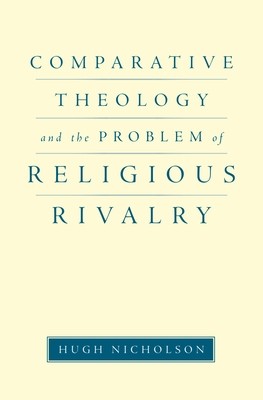
- We will send in 10–14 business days.
- Author: Hugh Nicholson
- Publisher: Oxford University Press, USA
- ISBN-10: 019977286X
- ISBN-13: 9780199772865
- Format: 15.8 x 23.4 x 3.1 cm, hardcover
- Language: English
- SAVE -10% with code: EXTRA
Comparative Theology and the Problem of Religious Rivalry (e-book) (used book) | bookbook.eu
Reviews
Description
In theological discourse, argues Hugh Nicholson, the political goes "all the way down." One never reaches a bedrock level of politically neutral religious facts, because all theological discourse - even the most sublime, edifying, and "spiritual"--is shot through with polemical elements.
Liberal theologies, from the Christian fulfillment theology of the nineteenth century to the pluralist theology of the twentieth, have assumed that religious writings attain spiritual truth and sublimity despite any polemical elements they might contain. Through his analysis and comparison of the Christian mystical theologian Meister Eckhart and his Hindu counterpart ÃaSkara, Nicholson arrives at a very different conclusion. Polemical elements may in fact constitute the creative source of the expressive power of religious discourses. Wayne Proudfoot has argued that mystical discourses embody a set of rules that repel any determinate understanding of the ineffable object or experience they purport to describe. In Comparative Theology and the Problem of Religious Rivalry, Nicholson suggests that this principle of negation is connected, perhaps through a process of abstraction and sublimation, with the need to distinguish oneself from one's intra- and/or inter-religious adversaries. Nicholson proposes a new model of comparative theology that recognizes and confronts one of the most urgent cultural and political issues of our time: namely, the "return of the political" in the form of anti-secular and fundamentalist movements around the world. This model acknowledges the ineradicable nature of an oppositional dimension of religious discourse, while honoring and even advancing the liberal project of curtailing intolerance and prejudice in the sphere of religion.EXTRA 10 % discount with code: EXTRA
The promotion ends in 18d.18:29:09
The discount code is valid when purchasing from 10 €. Discounts do not stack.
- Author: Hugh Nicholson
- Publisher: Oxford University Press, USA
- ISBN-10: 019977286X
- ISBN-13: 9780199772865
- Format: 15.8 x 23.4 x 3.1 cm, hardcover
- Language: English English
In theological discourse, argues Hugh Nicholson, the political goes "all the way down." One never reaches a bedrock level of politically neutral religious facts, because all theological discourse - even the most sublime, edifying, and "spiritual"--is shot through with polemical elements.
Liberal theologies, from the Christian fulfillment theology of the nineteenth century to the pluralist theology of the twentieth, have assumed that religious writings attain spiritual truth and sublimity despite any polemical elements they might contain. Through his analysis and comparison of the Christian mystical theologian Meister Eckhart and his Hindu counterpart ÃaSkara, Nicholson arrives at a very different conclusion. Polemical elements may in fact constitute the creative source of the expressive power of religious discourses. Wayne Proudfoot has argued that mystical discourses embody a set of rules that repel any determinate understanding of the ineffable object or experience they purport to describe. In Comparative Theology and the Problem of Religious Rivalry, Nicholson suggests that this principle of negation is connected, perhaps through a process of abstraction and sublimation, with the need to distinguish oneself from one's intra- and/or inter-religious adversaries. Nicholson proposes a new model of comparative theology that recognizes and confronts one of the most urgent cultural and political issues of our time: namely, the "return of the political" in the form of anti-secular and fundamentalist movements around the world. This model acknowledges the ineradicable nature of an oppositional dimension of religious discourse, while honoring and even advancing the liberal project of curtailing intolerance and prejudice in the sphere of religion.

Reviews